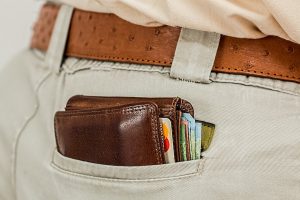You’re island hopping across the western Pacific Ocean. You’re amazed to find beaches with sand so white, it looks as if each grain has been bleached. Then just when you’re getting used to this splendor, you discover beaches with pink sand and, sometimes, black sand. As a scuba diver, you’re also thrilled by the bright tropical marine life.
Still, it gets better. As you continue your journey, you stay at a variety of luxury resorts, amble through the verdant countryside, and meet friendly people in the villages.
You’re in the Philippines on vacation. You finally made it here.
Unfortunately, there’s trouble in paradise.
For the last few days of your visit, you decide to go to Manila. It’s the nation’s capital, a bustling bay-side city on Luzon island. After a morning taking in the Spanish colonial architecture, you go to a local eatery because a few people you met at your hotel recommended it.
After you enjoy your exotic meal, you reach into your hip pocket to pull out your wallet to pay, only to discover it’s gone!
You remember slipping it into your pocket when you left the hotel this morning. You remember buying a cup of coffee at a cafe after you had visited San Augustin Church. Then you remember the crush of people on the local bus. It must have been a pickpocket!
Setbacks when abroad do happen, no matter how well we prepare for them. Even after making photocopies of our main documents, backups of all our computer files, and carefully reading travel advisory reports, troubles can still take us by surprise.
What to Do If Your Wallet is Stolen
 If your wallet is stolen when visiting another country, you must take some immediate steps. Essentially, there are four things that you must do: first, get some money sent to you from home; second, get help from the consulate or embassy; third, report the theft to the nearest police station; and forth, report the loss to your bank and credit card company.
If your wallet is stolen when visiting another country, you must take some immediate steps. Essentially, there are four things that you must do: first, get some money sent to you from home; second, get help from the consulate or embassy; third, report the theft to the nearest police station; and forth, report the loss to your bank and credit card company.
Let’s take a closer look at each one of these steps:
1. Get some money sent to you.
Call home and ask a family member or friend to send money to the Philippines. A money transfer allows you to receive a cash pickup at Metrobank. This will help you take care of your immediate expenses.
2. Get help from the consulate or embassy
Go to the consulate or embassy and tell them about what happened. They will assist in whatever way they can. They will help you get in touch with any emergency contacts. They will help you with any translation problems when you report the matter to the police station. And, if necessary, they will give you the temporary travel documents you need to get back home.
3. Report the theft to the police station.
It might seem futile to report the theft to a police station, but you never know. Somebody might find your wallet and turn it in. If that happens, the police will be able to contact you.
You will be briefly interviewed about the incident and have to fill out a police report. Although you’ll probably be furious or panicked, try to be as cool, calm, and collected as possible. Provide as much helpful information as you can.
If your wallet is recovered, at least you’ll be able to get your identity papers back. Reporting the theft might also help you with any identity theft issues, or with any verification that your bank or credit card company need to cancel your cards and issue you new ones. And you will definitely need documentation if you have to make any insurance claims.
4. Report the loss to your bank and your credit card companies.
After your visit to the police station, get in touch with your bank and your credit card companies to tell them about the theft and to get all your cards canceled immediately.
Act Quickly
In conclusion, if you ever lose your wallet when abroad, don’t spend time trying to look for it just in case you happened to have misplaced it. If you’re pretty sure that it was indeed stolen, then you should take these four steps. Yes, it’s upsetting, but you need to take practical steps first before you let emotions overwhelm your mind. Constructive action will prevent a bad situation from getting worse.
Photo Credits
White Sands – pixabay creative commons
Wallet – pixabay creative commons
Contributing Author Bio
Ashley Andrews
Ashley Andrews is an entrepreneur and blogger. She now lives in San Diego, CA and is happily self employed. She enjoys writing about anything that catches her interest, especially tech and entrepreneurship.



Please Share Your Thoughts - Leave A Comment!